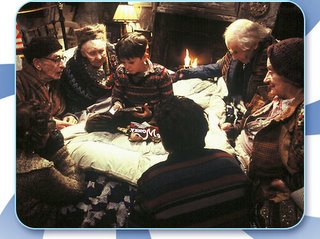Spoilers Ahead.
I liked book 7-- It has its cheesy moments, but one cannot forget that her largest following is children, and there are certain "must haves" for them. I do most of my
analysis thinking for young adults-- and I think that many young adult readers are going to find some of her must haves a little cheesy as well, but she is trying to appeal to an audience age range that is incredibly broad. I could also argue that theorists, like CS Lewis, say that authors should write without thinking about audience-- they should write what they want to say-- and I agree with that. Also, when you consider the idea of the death of the audience, that implies the story needs to go where the story needs to go, without consideration of the author's feelings-- and to that I also agree-- which is why I think the moments when Rowling forces the story to meet the must haves, it gets a little cheesy, but I don't fault the woman for doing it-- I don't know that I would want letters from parents telling me that I'd scared their child for life by killing off their hero.
So-- I'm glad she took the story where it needed to go--
I'm glad she followed all of the
gothic tendencies that she's put in the book and she made Harry a
horcrux-- I thought it was an important must have, that for
Voldermort to die, the piece that lived inside Harry had to die. As a fan, I'm glad that she used the Elder wand to kill the piece of
Voldermort without killing Harry. It made the story more complex and interesting to know that these complicated levels of magic that most people didn't know did exist.
I liked the talking/message bearing
Patronus-- I think she borrowed that from Pullman's witches-- their
deamons could go away from them and carry messages-- this is a way a piece of Rowling's witches and wizards can send themselves places.
For me, the book had a
apocalyptic type of feel-- it almost felt like the Left Behind books-- there's a small remnant of chosen people who will fight and be victorious, even though the odds are against them.
Anyway, I enjoyed it-- I'm both sad and glad that it's over. I'm interested to see what happens to the fan culture now-- if they will continue to write fan fiction that fills in the 19 years between the end of the story and the epilogue, or if that will have finished it off-- I'm curious to know if Rowling will be badgered into writing another book--which I don't think will meet up the the regular series standards-- who's Harry's opponent going to be-- Draco? And a story about a kid who has been a hero trying to make a normal life for himself isn't going to ring true-- it will be cheesy. So,
I'm interested to see.
FYI-- my favorite line from the book "NOT MY DAUGHTER YOU BITCH" (736).




